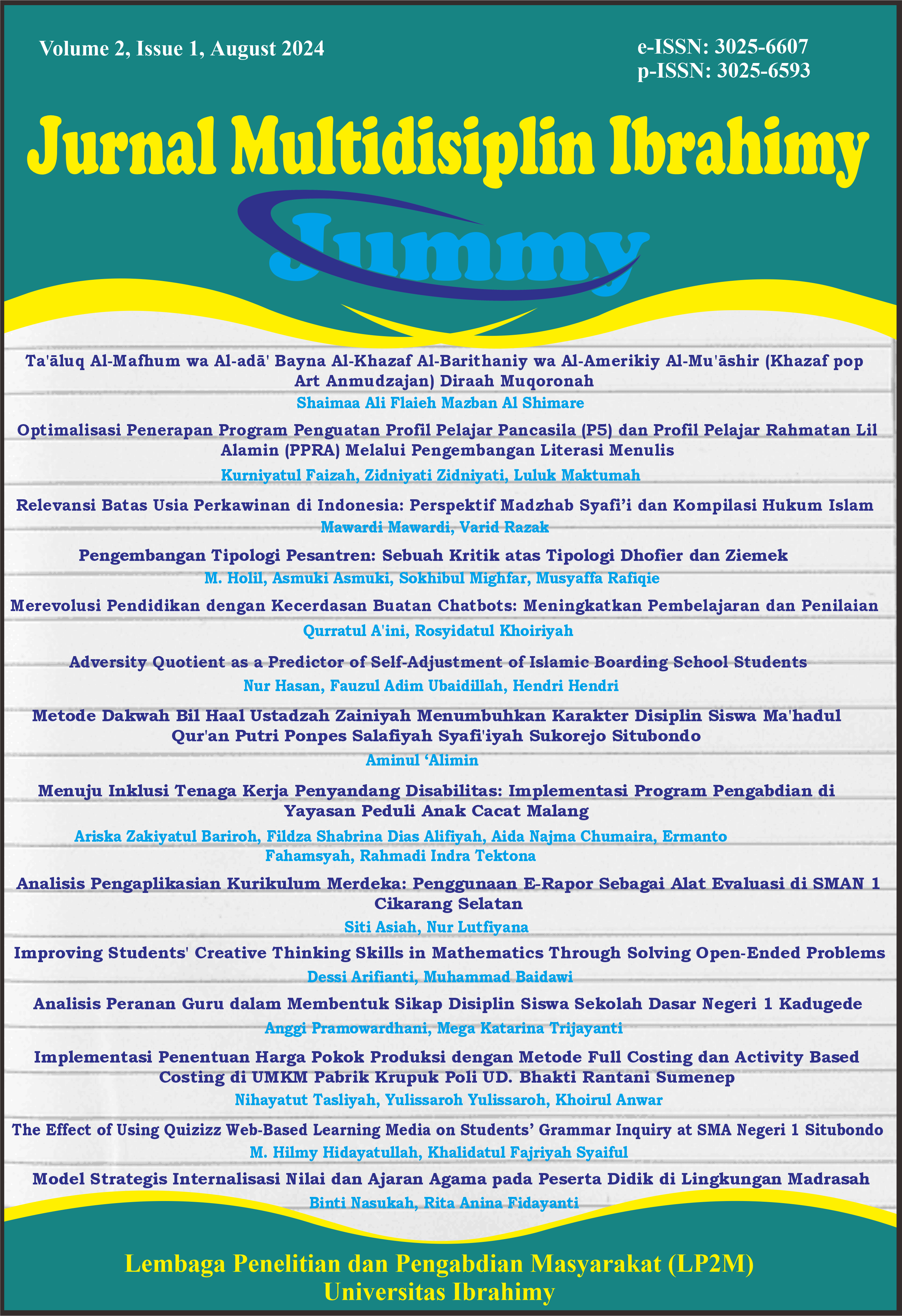Optimalisasi Penerapan Program Penguatan Profil Pelajar Pancasila (P5) dan Profil Pelajar Rahmatan Lil Alamin (PPRA) Melalui Pengembangan Literasi Menulis
DOI:
https://doi.org/10.35316/jummy.v2i1.5339Keywords:
Optimizing Program Implementation, P5, Pancasila Student Profile, PPRA, Rahmatan Lil AlaminAbstract
Writing literacy is one of the programs developed at MI Tarbiyatus Shibyan grade 6 to provide writing skills for students as one of the final assignment products before graduating from Madrasah. Writing literacy is not only a technical skill, but also as a means of strengthening the values of character, spirituality and social awareness promoted by the Program for Strengthening the Pancasila Student Profile (P5) and the Rahmatan Lil Alamin Student Profile (PPRA). The aim of this research is to explore the optimization of the implementation of the Pancasila Student Profile Strengthening Program (P5) and the Rahmanan lil Alamin Student Profile (PPRA). This research uses a qualitative approach with a qualitative descriptive type. Source selection uses purposive and data collection techniques using observation, interviews and documentation. The data analysis techniques used are data condensation, data presentation, and drawing conclusions. Data validation uses triangulation of sources and techniques. The results of this research are that there were 11 groups, each of which produced 11 paper talk products, which in the process integrated the P5 values, namely Mutual Cooperation, Independence and Critical Reasoning, while the PPRA values applied were Deliberation (Shura), Tolerance (Tasamuh), Dynamic and Innovative (tatawur and Ibtikar).
References
Al-Misri, A. (2015). Islamic Ethics. Cairo: Dar al-Fikr al-Arabi.
Al-Ghazali, A. (2017). Social Responsibility in Islam. Kuala Lumpur: Islamic Publications.
Al-Attas, S. M. N. (1980). Islam and the Philosophy of Science. Kuala Lumpur: International Institute of Islamic Thought and Civilization (ISTAC).
Al-Faruqi, I. R. (1982). Islamization of Knowledge: General Principles and Work Plan. Herndon, VA: International Institute of Islamic Thought (IIIT).
Al-Naqib, K. (2005). Education in Islam: From Traditional to Modernity. Cairo: Anglo-Egyptian Bookshop.
Dewi, E., Sari, L., Murtadlo, A., Studi, P., Pendidikan, M., Indonesia, B., & Mulawarman, U. (2017). Membaca Melalui Gerakan Literasi Sekolah. Jurnal Ilmu Budaya, 1(4), 341–352.
Faizah, D. U., Sufyadi, S., Anggraini, L., Waluyo, Dewayani, S., Muldian, W., & Roosaria, D. R. (2016). Panduan gerakan literasi sekolah di sekolah dasar. Direktorat Jenderal Pendidikan Dasar dan Menengah Kementerian Pendidikan dan Kebudayaan.
Kemendikbudristek. (2022). Dimensi, Elemen, dan Subelemen Profil Pelajar Pancasila pada Kurikulum Merdeka. Kemendikbudristek, 1–37.
Koesoema, D., Sutjipto, Setiawan, D. I., Hanifah, N., Miftahussururi, Nento, M. N., & Akbari, Q. S. (2017). Pedoman penilaian dan evaluasi gerakan literasi nasional. Kementrian Pendidikan dan Kebudayaan.
Sugiyono. (2013). Metode penelitian kuantitatif, kualitatif, dan r&d. Penerbit ALFABETA BANDUNG.
Tias, I. W. U., & Octaviani, S. (2018). The Effect of Using The Project Based Learning Model On ( Quasi Study Experiments for Class V Students of SD Negeri 8 Metro Timur , SD Negeri 1 Metro Barat, SD Negeri 1 Metro Utara dan SD Negeri 5 Metro Pusat). Journal of Humanities and Social Studies, 02(02), 25–30.
Downloads
Published
How to Cite
Issue
Section
License












_by_Matematohir.jpg)


